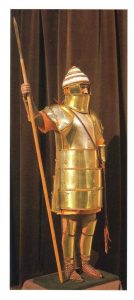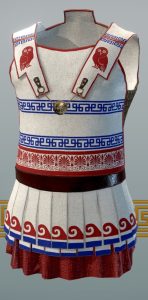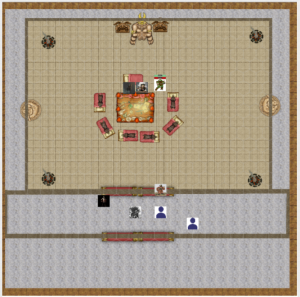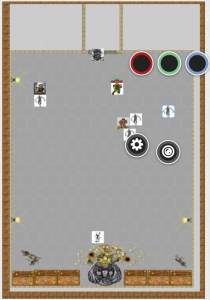This interlude takes place after the end of Episode 10, directly, and came about because, as happens in real life, a few players had other commitments and I think the next part will be the end of the adventure and this stage of the campaign. This is adapted from a pre-written adventure. I’ll link to it at the end.
José, Utana and Farshad crowd the door, looking into this room in the palace where corpses on couches lie around an eerie lit mapboard, when one of the corpses, in a position of honour, turns to stare at them, the eyes flashing a shade of green that they have seen all too often of late. The green expands to fill all of their vision. When it fades they are no longer in a palace under an earthen mound, but standing on a dusty road at a crossroads, the weather is gloomy and dull, they cannot tell where the sun or what the time is.
The roads in each direction are free of traffic, the terrain is rocky, with only the only plant life José can find scrubby, not of use in medicine but some use in cooking or for water. Utana examines the terrain and the soil is reminiscent of a plateau at the northern Haraxan border, but that area is not as desolate as this, as wells, reservoirs and irrigation have aided farming and supported a reasonable population.
Here the only sign of habitation is a walled villa, the house large, at least three stories high, looking like a trincated pyramid made of mud brick. Looking around, Utana spots that once there were other houses, but they are ruined, the bricks mostly dust, those left looking like rocks jutting out of the ground.
The group speculates not only where they might be, but when. Depictions of the night sky in the tomb complex showed, to Utana’s Navigator’s eye, that some guiding stars were not where they should be. As they speculated, two young children appeared from the gate to the villa, a girl and a younger boy, the boy held a wooden doll but neither that nor his sister could comfort him as he sobbed.
They stopped, hesitantly, half way between gate and group, the boy hiding behind his sister as she pleaded for help, that there was a creature of some sort living under the villa. They heard the whispers of formless words, and the screams of this creature terrifies them. Please will the group help them.
The group did not ask the children’s names (Parigul and Taimur btw) but later asked about their parents. Their father had died when young, their mother, Ramineh has been sleeping, for a long time. The villa is owned by their uncle and aunt, and they forbid the children for going under the villa, where the creature is, not that they would want to. There is no basement, or cellar, yet underground is where it is.
The group were perturbed, and suspicious of the children, but they seemed as real as they themselves were, though José, perhaps through some premonition, did not use his empathic abilities on the children
And so to the compound, which was as far as the children would go, the crumbling brick surrounded by fading and cracking plaster, indifferently decorated in an alien style perhaps related to decorations seen in the tomb.
The door into the house was similsarly decorated, and opened into a reception area, with stools and tables. However the striking thing about the room was the wall decoration. Above the door opposite was the black and silver figure of a woman sitting crosslegged, arms outstretched, her face obscured by shadow. Along the walls at either side were figures, those in the left facing right towards her, those on the right facing left, all in supplication. The figures closest to the woman were older and there were gaps between the furthest away and the door they entered by.
The next room seemed more of a family area, lit by oil lamps, the room had couches and tables arranged around a fireplace over which were a bronze headed spear and a large single edged slashing sword. The fireplace, set for a fire, was primitive, but a proper fireplace, with a narrow chimney. The utensils on the tables were a mixture of wood, bone, some copper and one silver, but there was no sign of food or drink laid out. Apart from the silver spoon and a couple of oil lamps, the group took nothing, not even the spear and sword.
To the rear was a set of stairs up, and a short corridor with a door left, another ahead and an open doorway right leading to a kitchen. Carefully opening the door to the left first revealed a combination taxidermist workshop and study, divided by an obviously bespoke dresser which, on the workshop side had drawers of tools, on the study side with its table with three thin bone cups and flask of fluid, fur covered seating, stuffed bear and animal heads, Farshad unlocked the dresser to find bronze headed javelins, bronze hunting knives and a shortbow with bronze arrows and spare strings. There were belts, scabbards and quivers for these, as well as a bone gameboard, obviously a form of “Balatu”, and spare thin bone cups matching those on the table. The group took the weapons and left the furs, tools and drinking materials behind.
The kitchen was clean and set out as if ready to be starting to be used. The fire was set, utensils out, plates laid out, cooking pots well used but clean. There were alcoves, some with food, they didn’t taste any but the honey they found in a jar looked fresh rather than aged and a final alcove had a hole in the ceiling above, a tray and a pulley system.
The door at the end of the corridor was stuck fast, seemingly blocked from the other side, but Utana noticed something strange. The wall at the rear of the workshop did not extend to the same level as the door, though the kitchen wall did. Some gentle tapping then later heavy thumping revealed a hollow space, though one behind solid walls.
The primitive but functional kitchen did not hold interest for long, and so they went upstairs to a dim landing, with three doors off it. In the gloom the oil lamps and torches taken from downstairs were of use to reveal that nature of shapes against the walls. On one side of the hall stood three wooden mannequins dressed in heavy bronze armour of a very, to the group, antique style of overvapping plates, greaves and arm guards, holding a bronze spear and with a short, single edged cutting bronze sword hanging on a baldric.
upstairs to a dim landing, with three doors off it. In the gloom the oil lamps and torches taken from downstairs were of use to reveal that nature of shapes against the walls. On one side of the hall stood three wooden mannequins dressed in heavy bronze armour of a very, to the group, antique style of overvapping plates, greaves and arm guards, holding a bronze spear and with a short, single edged cutting bronze sword hanging on a baldric.
On the wall side where they came up was a relief in painted plaster showing two groups of humans. A richly dressed and accessorised couple, a man and a woman, looking disdainfully at the other, plainly dressed, group, a woman with her hands resting on the heads of a boy and girl that, to no one’s surprise, resembled the two met outside.
Of the doors, there was a plain door and an intricately carved door to the north, and another carved door to the south. The plain door revealed cubicles, servants quarters most likely, with plain cots, a small table and a chest that also served as a chair, but no sign of occupancy or personalisation, the hole in the kitchen ceiling matched up with one in the floor that went up through the ceiling here also. The carved door to the north opened up to some kind of scriptorium and library. There was a work desk with blank papyrii and writing materials, and along one wall the bronze age equivalent of a Kallax containing papyrii and clay tablets. The writings were mostly oin an older script, now only used by sacholars, but enough symbols and illustrations were held in common that they got the feeling that some were religious texts, others mythological tales, others works on alchemy and herblore, still more on farming and household matters and even accounts.
One set of shelves proved to be movable, by holding handles built into a sturdy shelf, the whole thing could be dragged forward to reveal a space behind. There were more shelves to tablets, which were ignored, as the attention was focused on a chest in the back over which were the bones of some long dead mortal, clothes rotted to rags, most of the bones fallen to the floor. In what might have been the chest cavity once, were hollow bronze quills, sharp and discoloured at one end that they suspected were part of a poison trap. Farshad determined that the chest was now safe and the primitive lock held no challenge to him. Inside were a wooden and a bone box, the wooden contained small ingots of copper and some silver, the bone sewing utensils and spools of silver and copper wire. The silver they took.
There was also a tablet, written in the ancient Ebbarrisi script but though they were barely familiar with it, the meaning impressed itself to them, as well as the name “Kabbaruk”, the name of the long dead king in whose tomb they had been before being transported here.
“His sublime and noble lord, Kabbaruk, King of Kings, first servant of Ilot-Nahas, upon whom her power on earth is granted, admits to your existence.
“You have sent him accounts of your deeds, hoping to gain favour with the dread mistress of the untameable chaos, the true state of the universe, may her name bring awe and fear to all who deny her, he has read them and found them pitiful.
“Your claim to power, estate and rank in her name, the mighty lord Kabbaruk rejects, and bids you consider yourself fortunate, had he not been amused by your tawdry acts, lacking in wit and imagination, he would have you expirated for your presumption.
“Crawl in the dust and prays he takes no further notice of you, as this may yet occur.
“Sealed by his hand Okkuristes, in the 129th year of the lordship of Kabbaruk”
With this combination of treasure and threat, the group turned to the last door, also decorated, which seemed to open onto a performance area. A slightly raised section with various musical instruments, including a pair for flutes Farshad took, and an audience section. There were paintings on the walls of dancers and musicians, though the group paid then no more attention than they did to the other decorated surfaces.
There is much conversation at various points to here about the abscence of people in the building so far and were the children real? They seemed as real as the group themselves, but the circumstances just scream “these kids are ghosts” but so far, whilst the place is obviously antique and there is a feeling of being lost in time, there is no proof.
 From there they went up a floor, finding again a gloomy landing with four doors off it, one to the north, two to the west, between which stand three wicker mannequins dressed in light linen armour and a door to the south.
From there they went up a floor, finding again a gloomy landing with four doors off it, one to the north, two to the west, between which stand three wicker mannequins dressed in light linen armour and a door to the south.
The armour is made of layers of cloth bonded with resin (the notion of glued layers has no real evidence behind it for the historical types but in this world it is) and the mannequins also hold short bronze headed spears and shields.
I didn’t mention it at the time, but should have, the armour is decorated with script sewn into it in silver and copper wire.
They try the door to the north first, finding a well appointed but dusty and cobwebbed. The group take just a cursory glance, though they note that they have seen webs, but no spiders, and decide to look through the other rooms first.
As they move to the nearest western door, the mannequins start to move, one slams at Utana with a spearbutt as an opening move, and a fight ensues. There is some concern from José as to whether they have the right weapons with which to fight spirit driven constructs, until he remembers that the three have silvered or magical weapons. Farshad also makes use of his torch, thrusting it into a mannequin like a club and sticking it in, unfortunately it is knocked free by a later blow. However, after suffering some bruising themselves, the mannequins are brutalised to a point of destruction, including one being knocked downstairs.
After all that, the western rooms prove to be an anti-climax, a guest room, also dusty and cobwebbed, and a store for bedding and cleaning materials, though after being so fatigued that using the full powers of his sword would have cost him his true lifeforce, Farshad does crash on some bedding. at least momentarily.
The room to the south has three beds. One is an adult sized, the other two smaller as if for children. There are chests and tables here, and the impression is of making it look like a family suite, but it is dusty and uncared for. The whole impression is of plainer and simpler decoration and work than the bedroom to the north.
The group looks around, Utana going to the adult bed, there is no body there, but the figure of a woman, resembling the women with the children in the plaster relief downstairs, rises up. Before the others can react, she shrieks at Utana and José, freezing them where they stand. Farshad trades blows with her, his shortsword vs her raking claws, and the damage she suffers breaks the concentration that holds José and Utana in place.
With them unfrozen, the spirit does not last long , a figure of sadness and pity now rather than terror as weapons of silver or infused with magic rip the fabric of her being apart.
The room has one other suprise, a secret cubby with a ladder upstairs, but after finding that, the group go back to explore the first bedroom, searching it, and the rooms off it, including a small observatory platform. A thorough search of the main bedroom reveals, secreted in a hole in the floor under one side of the bed, a small chest, chased with silver and semi-precious gems, containing two golden rings, one of which has a pearl mounted in it, the other has a seal, and a necklace of semi precious beads strung on copper wire.
And there, with some new found wealth, we left it.






